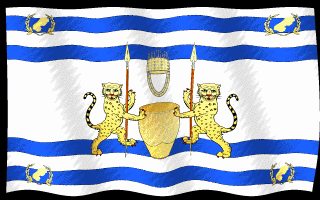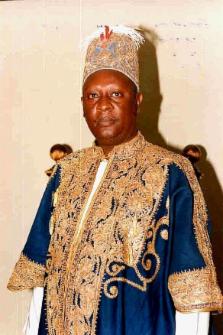ROYAL FAMILY - H.M. The Omukama (King)


His Majesty
Rukirabasaija Agutamba Solomon Gafabusa Iguru I.
49th Omukama (King) of the Kingdom Bunyoro Kitara
27th Omukama in the Babiito Dynasty
Great titels of HM the Omukama
– 49th Omukama of The Kingdom of Bunyoro-Kitara, 27th Omukama in The Babiito Dynasty-
The Sovereign Head and Grand Master of The Royal Order of Omujwaara Kondo and The Royal Order of Engabu, The Sovereign Head, Grand Master and Protector of The Most Honourable Order of Omukama Chwa II Kabalega, The Royal Patron of The Chivalrous and Religious Order of the Crown of Thorns, The Royal Patron of The Sovereign, Knightly and Noble Order of The Lion and Black Cross etc. etc. etc.-
In addition, His Majesty The Omukama (King) Rukirabasaija Agutamba Solomon Gafabusa Iguru I. was specifically recognized as the rightful King of Bunyoro-Kitara by the Supreme Court of Uganda (see Civil Appeal 18/94 and All Members of the Committee of Coronation of Prince Solomon Iguru of April 25, 1994). Similar to other reigning monarchs, the traditional kings currently serve as "cultural figures" or "traditional leaders" and are barred from engaging in politics.
His Majesty The Omukama is the 49th Omukama of The Kingdom of Bunyoro-Kitara and 27th Omukama in The Babiito Dynasty.
Because his ancestors never renounced their rights, never abdicated the kingdom, never ceded sovereignty, suffered exile rather than capitulate and concede anything, they maintained their original royal status and sovereign rights. This is very significant as His Majesty The Omukama (King) Rukirabasaija Agutamba Solomon Gafabusa Iguru I. is not simply a constitutional king. He is also the heir to a dynasty that has kept all its ancient rights intact.
HM The Omukama (King) of Bunyoro-Kitara Kingdom and the Bunyoro-Kitara Kingdom were restored by the Amendment (No. 8) Act - Statute No. 8, Article 118 (1)- of 1993 enacted by the Parliament of Uganda AND officially recognized and protected by the Constitution of the Republic of Uganda by Chapter IV. –Article 37.-, Chapter XVI. -Article 246. (1) – (6)- of 1995 AND by the Amendment (No. 2) Act -schedule V. -Article 178.8- of 2005 AND by the Acts Supplement (No. 4) -Act 6. of 2011
Chapter Sixteen—Institution of Traditional or Cultural Leaders
246. Institution of traditional or cultural leaders.
(c) a traditional leader or cultural leader shall enjoy such privileges and benefits as may be conferred by the Government and local government or as that leader may be entitled to under culture, custom and tradition;
(d) subject to paragraph (c) of this clause, no person shall be compelled to pay allegiance or contribute to the cost of maintaining a traditional leader or cultural leader;
(e) a person shall not, while remaining a traditional leader or cultural leader, join or participate in partisan politics;
(f) a traditional leader or cultural leader shall not have or exercise any administrative, legislative or executive powers of Government or local government.
(6) For the purposes of this article, "traditional leader or cultural leader" means a king or similar traditional leader or cultural leader by whatever name called, who derives allegiance from the fact of birth or descent in accordance with the customs, traditions, usage or consent of the people led by that traditional or cultural leader.
Where a traditional leader or cultural leader exists in a region the traditional or cultural leader shall—
(a) be the titular head of the regional government;
(b) be the titular head of the regional assembly and shall open, address and close the sessions of the regional assembly; and
(c) enjoy the benefits and privileges and roles as provided for in article 246 of this Constitution and by Parliament and the regional assembly.